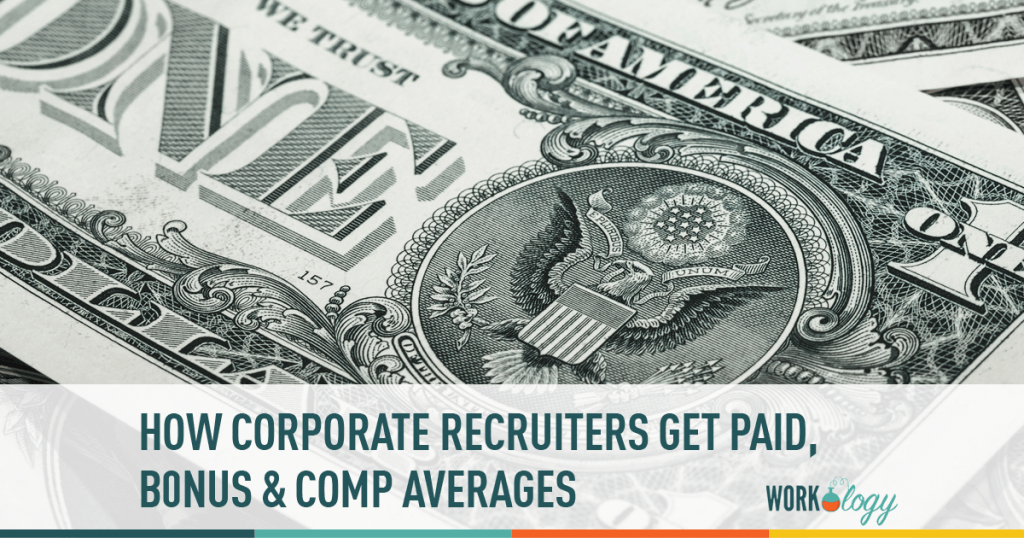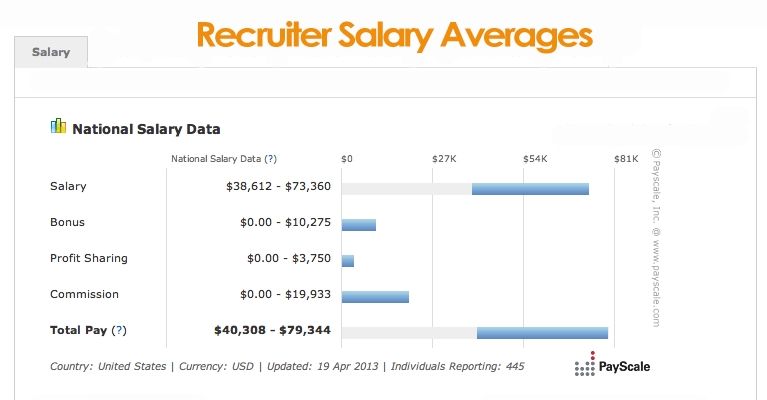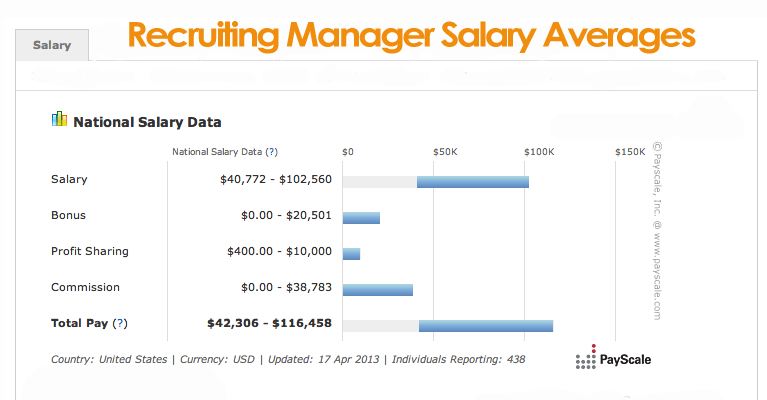*This post has been updated as of January 2017 and provides insights and trends into recent recruiting compensation and bonus trends.
This blog affords me the opportunity to share my insights, experiences and lessons having worked in HR and recruiting. The value I really get is through helping others and serving as a platform for practitioner discussion often allowing them a voice anonymously. Just last week was one of those times as I received a reader question relating to compensation and common bonus structures for corporate recruiters. Here’s the gist:
Hi Jessica. I’m a recruiting manager for a large Fortune 200 company. I’ve worked at my company for a while and moved up the ranks quite nicely. I wondered if you had any data on average recruiter and recruiting manager bonus as a percentage of their of base. Is there an industry standard in how corporate recruiters bonus and are paid?
While I’ve oversaw bonuses and been responsible for explaining bonus packages to employees, I’ve never received of a bonus as a recruiter only as HR, and that’s a shame. I’m an extremely competitive person and have always been motivated through a little healthy competition, compensation and most importantly winning. Enough though about me.
Going Beyond Base Salary Compensation and Variable Pay
When it comes to compensation for recruiters and recruiting managers that goes beyond a base salary, there are typically three areas that fluctuate based on your performance, time in position and the success of the company. Compensation that fluctuates is called variable compensation because it changes based on different circumstances and goals set by your employer with regard to the specific performance of that employee.
- Bonus. Bonuses are payments you make to employees that are not regular but generally bi-annually, annually or quarterly. This form of compensation are based on if department, company or combination of goals which are met as outlined by your organization, department or company. Bonuses are given to company management or other employees who are not directly responsible for selling the company’s products or services.
- Commission. A commission is a payment arrangement where employees receive a percentage of sales they bring to your company. Whether you pay an employee a commission in addition to a salary or just a straight commission depends on the nature and demands of the job. This is a common practice among third party recruiters but not corporate recruiters generally. For the purposes described here, we are assuming that recruiters and recruiting managers receive a base pay/salary and other incentives as a corporate recruiter and not third party.
- Profit Sharing. Profit sharing refers to various incentive plans introduced by businesses that provide direct or indirect payments to employees that depend on company’s profitability in addition to employees’ regular salary and bonuses. In publicly traded companies these plans typically amount to allocation of shares to employees.
The average for each of the three common types of variable compensation for recruiters and recruiting managers vary based on things like experience, location and company size. For the purposes of our example, I chosen to compare compensation differences between recruiters and recruiting managers companies both large, small and in between.
Corporate Recruiting vs. Third Party (Agency) Recruiters
Keep in mind the larger the company, the more likely the compensation is increased. Pay bands are typically larger for companies with over 20,000 employees allowing for employees to be compensated for experience, performance and industry. It’s no surprise that the average bonus for a recruiter and recruiting manager depends widely on experience on geography as one would expect. Experienced recruiters based on the national average bonus as much as $10,500 per year versus a recruiting manager bonus of $20,500. A bonus differs from commission as I mentioned because corporate recruiters aren’t typically paid this way. The pay band variables for compensation in recruiting depend on things like city, industry and years experience. Commission is a third party compensation benefit which adds to the confusion in the industry. You can compare the differences between recruiter and recruiting manager by seeing the national salary data for recruiting manager, pictured below.
Bonus and profit sharing averages also vary based on position. This is common when discussing compensation as companies often have their own corporate language to describe positions as well as the company culture which is why using an algorithm can be a powerful way to cut through the noise when analyzing and comparing best practices between positions, industries or companies.
I have however, as of recent in 2017, seen a number of corporate recruiting teams who are moving to a more traditional agency and third party recruiter model especially those who are technology companies that hire heavily in the areas of sales and development. In fact, a growing trends I see is that a larger number of recruiting teams report no longer to HR but directly to engineering in but also directly to the CEO. I think this change makes for changes in compensation plans in the way we have traditionally seen in talent acquisition teams. Personally, it could be a welcome change.
For the HR professionals and compensation experts out there, how do you pay your corporate recruiters? Do you offer bonuses, commission, profit sharing, all of the mentioned or none at all? Weigh in as I know this is a common question posed for recruiters and others in our industry.
Interested in compensation trends for contract recruiting roles? Click here for more resources.












4 Comments
I don’t necessarily think the claim that recruiters in large companies make more money than those in smaller ones – in fact, in my experience, the opposite is true. But same goes for candidates. Because as everyone who’s ever recruited for an “employer of choice” (read: no cold calling required) knows, the bigger the brand, the more likely you are to pay under market. And salary bands restrict, rather than enable, flexibility on total compensation. But as this post demonstrates, the larger the company, the more specialized the people in the HR department are – and recruiters and compensation are almost always mortal enemies ignorant of what the others’ job actually entails.
Hi Matt,
Thanks for the comment. My statement that recruiters in large companies make more money than those at smaller organizations is based on the information from PayScale and their report. I’m a fan of flexibility and have and would gladly accept a position at a smaller company that offers work from home options, flex scheduling or other benefits other than just monetary compensation. For me, opportunity and learning ways heavily on working for a company. Being specialized is nice but sometimes you work yourself into a niche that locks you into a specific position without a lot of upward, industry or vertical movement.
JMM
Jessica, thanks for the post! I was trying to understand my recruiters motivations moving forwards after hire (past 6 months or whatever) It would be cool if they got paid based upon the ultimate success of their hires. That way as the company grows, if the recruitor was the one to pick the right employees, then they would rise with them and that seems like the best incentive possible
I am looking for information/advice regarding what I should ask my employer for. I currently work a full-time job, and the owner of that company started a construction temp agency. Because I have work experience as a recruiter, she asked me to help her start it up. Due to it being a start-up, I did not think twice about setting up an agreement. But now that it is running successfully and my workload has doubled, I am now trying to find research on what kind of compensation I should be making. I am currently being paid hourly for a couple hours a day for employee management, recruitment, and payroll, but not making any commission on my sole customer’s invoices. I will, in the future, also be responsible for the business development side until I can no longer handle the workload alone. When we are ready to take on another customer, I would like to have a compensation agreement between us so there is no confusion, and I just need advice on how to move forward with this company and help it grow, while also making it worth my time. If you can offer any suggestion on a part-time business development/recruiter salary/commission, I would be so grateful! I don’t want to be greedy, but it also needs to be worth my time.
Comments are closed.